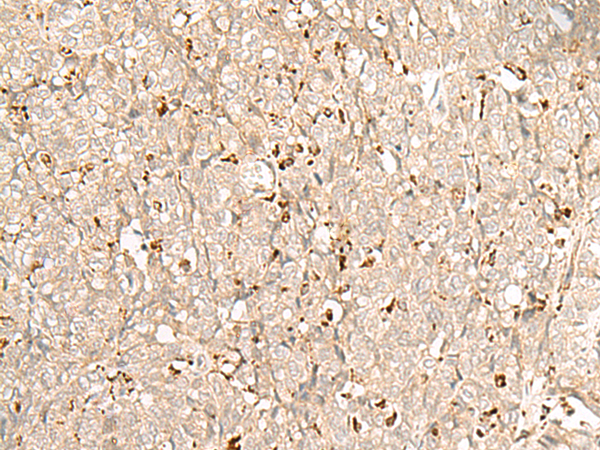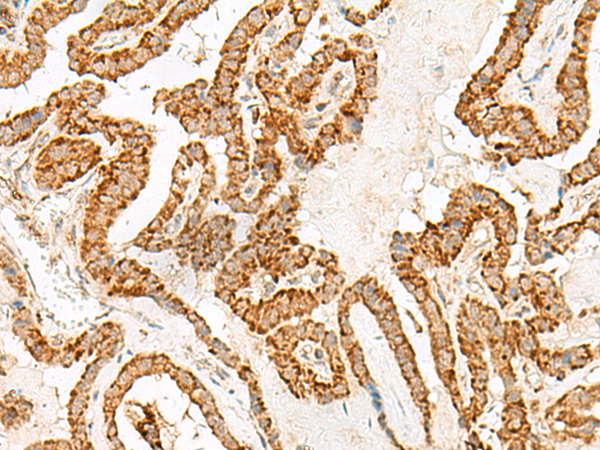

| WB | 咨询技术 | Human,Mouse,Rat |
| IF | 咨询技术 | Human,Mouse,Rat |
| IHC | 1/30-1/150 | Human,Mouse,Rat |
| ICC | 技术咨询 | Human,Mouse,Rat |
| FCM | 咨询技术 | Human,Mouse,Rat |
| Elisa | 1/5000-1/10000 | Human,Mouse,Rat |
| Aliases | GP210; POM210 |
| Host/Isotype | Rabbit IgG |
| Antibody Type | Primary antibody |
| Storage | Store at 4°C short term. Aliquot and store at -20°C long term. Avoid freeze/thaw cycles. |
| Species Reactivity | Human, Mouse, Rat |
| Immunogen | Synthetic peptide of human NUP210 |
| Formulation | Purified antibody in PBS with 0.05% sodium azide and 50% glycerol. |
+ +
以下是关于NUP210抗体的3篇参考文献及其摘要概括:
---
1. **文献名称**: *NUP210 deficiency causes muscle stem cell aging via destabilized microtubule nucleators*
**作者**: Raices, M. et al.
**摘要**: 研究通过NUP210抗体检测发现,NUP210缺失导致肌肉干细胞中微管组织中心(MTOC)结构异常,影响细胞极性维持和分化能力,揭示了其在肌肉再生中的关键作用。
2. **文献名称**: *Nuclear pore protein NUP210 modulates TGF-β signaling and regulates cancer cell EMT*
**作者**: Sakuma, S. et al.
**摘要**: 利用NUP210抗体分析发现,NUP210通过调控TGF-β信号通路促进上皮-间质转化(EMT),其高表达与乳腺癌转移和患者不良预后显著相关。
3. **文献名称**: *NUP210 anchors the immune synapse at the nuclear membrane to enhance T cell activation*
**作者**: D'Angelo, M. A. et al.
**摘要**: 研究通过免疫荧光结合NUP210抗体证实,NUP210在T细胞免疫突触处富集,通过稳定核膜结构促进信号转导,影响T细胞活化和免疫应答效率。
---
这些文献均使用NUP210抗体进行蛋白定位、表达分析或机制研究,涉及肌肉干细胞、癌症转移及免疫调控等领域。如需具体DOI或发表年份,可进一步补充检索。
NUP210 (Nucleoporin 210), also known as gp210. is a transmembrane protein component of the nuclear pore complex (NPC), which regulates nucleocytoplasmic transport in eukaryotic cells. As one of the largest nucleoporins, NUP210 localizes to the inner nuclear membrane and plays a critical role in maintaining NPC structural integrity and nuclear envelope organization. It is involved in cellular processes such as cell differentiation, mitosis, and transcriptional regulation. Antibodies targeting NUP210 are valuable tools for studying its expression, localization, and function in both physiological and pathological contexts.
Research has linked NUP210 dysregulation to various diseases. In cancer, altered NUP210 expression is observed in malignancies like breast cancer and colorectal cancer, where it may influence tumor progression and metastasis. Antibodies against NUP210 enable detection of these expression changes via techniques like immunohistochemistry, Western blotting, or immunofluorescence. Additionally, NUP210 autoantibodies are identified in autoimmune conditions, such as primary biliary cholangitis (PBC), serving as diagnostic biomarkers.
Recent studies also explore NUP210's role in neurological disorders and muscle cell differentiation. Its antibody-based profiling contributes to understanding NPC-related mechanisms in disease pathogenesis, offering potential therapeutic insights. Commercial NUP210 antibodies are typically validated for specificity across human, mouse, and rat models, supporting diverse experimental applications.
×